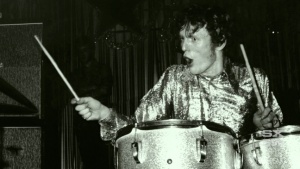
Cream drummer Ginger Baker in BEWARE OF MR. BAKER (SnagFilms)
Beware of Mr. Baker has all the usual ingredients of a typical rock ‘n’ roll Behind the Music bio, though it has lots of surprises and unusual brio, too, beginning with the opening scene where legendary drummer Ginger Baker punches the film’s debut director, Jay Bulger, in the nose.
The documentary’s first surprise is seeing Baker ensconced on a gated South African estate, living with a young wife (his fourth) and stepdaughter, and owning a stable of polo ponies. Bulger first faced Baker there in his lair for a series of (then unauthorized) Rolling Stone interviews. Baker struck him when he learned that family and friends were also being interviewed, and they sure have a lot to say about the man with the short fuse and the pounding sticks.
His early biography is similar to other leaders of the British rock invasion, with a youth in wartime England surrounded by the blitz, and he grew up under the shadow of a hero dad killed in action. His sister notes the redhead drummer has inherited “the Baker temper,” which he channels into what he proudly proclaims as his sense of “natural time,” which he also calls a “a gift from god.” The second surprise is that jazz was the music he first fell in love with, and he enthuses about learning from the albums of Americans Art Blakey and Max Roach. Noted British jazz drummer Phil Seamen not only mentored his musical style but inducted him into using heroin, leading to decades of addiction. The third surprise is the early influence of what is now called world music. Baker describes how he first heard the drums the new African immigrants brought to England, and he assimilated their rhythms into his style by the time he met up with bassist Jack Bruce in their first band together, the Graham Bond Organisation.
Parallel to the admiring testimonies from other drummers such as Charlie Watts (the Rolling Stones) and Lars Ulrich (Metallica) about Baker’s brilliant playing when he hit well-known rock stardom with Bruce and Eric Clapton in the band Cream, Baker’s first wife and kids frankly detail the difficulties of living with him (let alone being overrun by his groupies). Nearly five decades later, Baker chuckles “I’ll choose the drums” over family.
After Baker returned to jazz and got to play with his idols Elvin Jones and Max Roach, his life took another surprising turn when he drove across the Sahara, filmed by Tony Palmer, and landed in Nigeria in 1972 amidst the rise of Fela Kuti’s Afrobeat musical revolution. Their collaborations are lost masterpieces of world music fusion, as described by Kuti’s son. Past the whirlwind of a very young second wife (not interviewed), there’s a third spouse, an American, who seemed to be a surprisingly calming influence with her hippie lifestyle, and a brief reconciliation with a son. Incongruously, Baker became obsessed with polo, which leads in an astonishingly convoluted path to his living in South Africa with lots of dogs and horses. Now into his arthritic 70s, he wields a cane like a weapon against anyone who makes him angry, which is almost anyone.
Bulger is extraordinarily patient in sorting out decades of stories and confusing points of view, and a marvel at finding visual documentation of Baker’s long and winding roads around the globe, filled in with clever animation directed by Tatia Rosenthal ($9.99). But as each phase of Baker’s life seems to be a temporary wild adventure, his mad drumming, let alone his madness and his addictions, seem to be the only constants, and very entertaining to watch—from a safe distance.






Leave A Comment